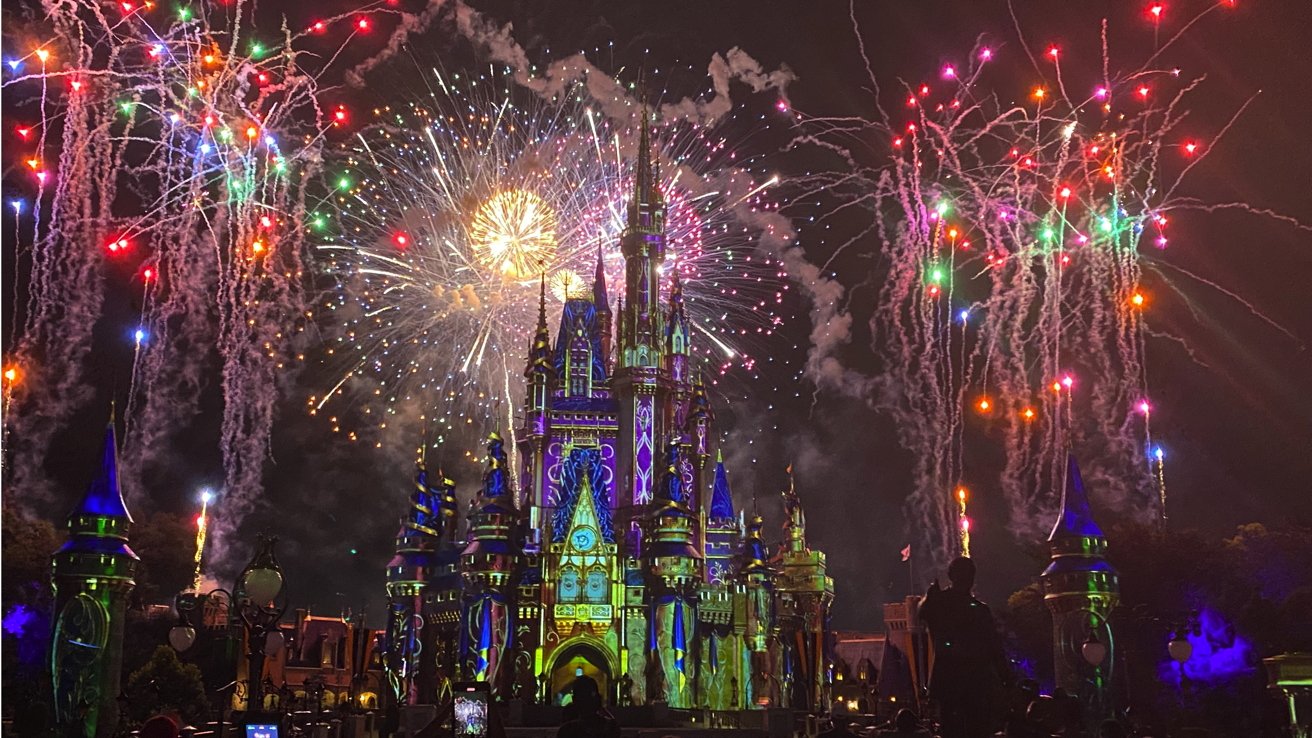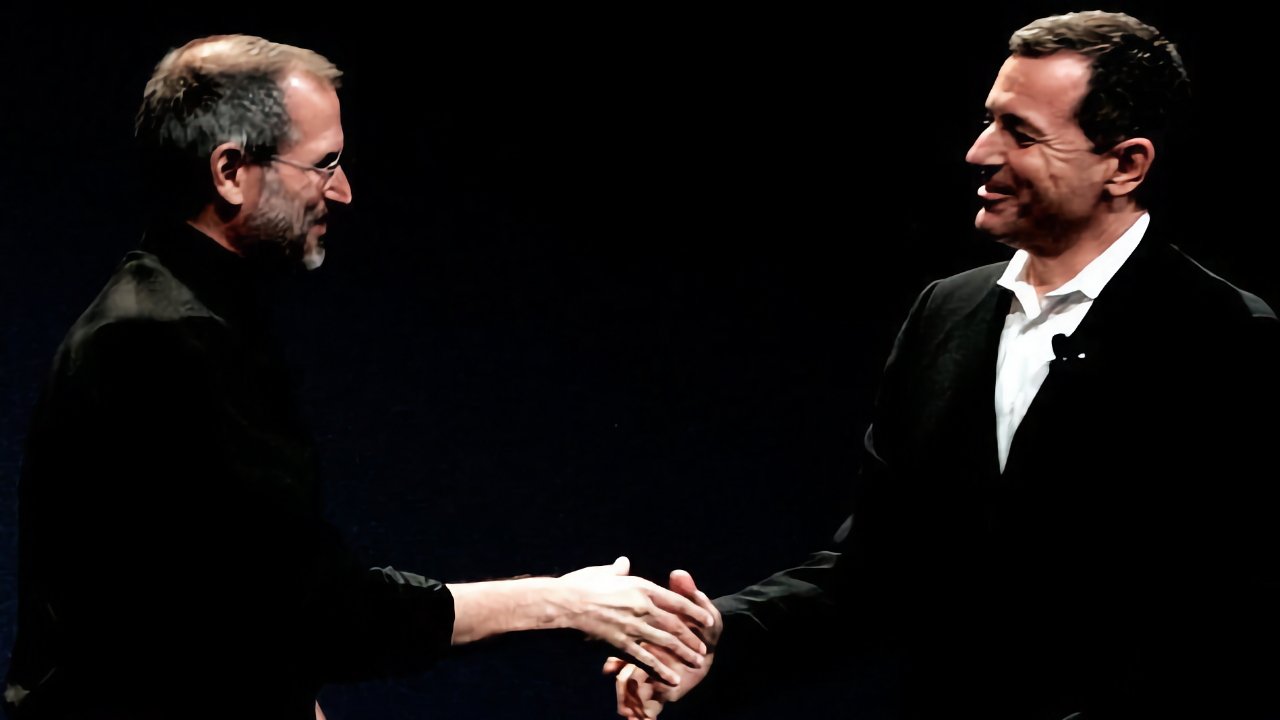AppleInsider may earn an affiliate commission on purchases made through links on our site.
The rumor that Apple will buy Disney is old enough to buy an overpriced beer at EPCOT. And, six months after we last talked about it, it’s back yet again, with talking heads inspired this time by Apple “getting serious” about streaming.
The rumor that Apple will buy Disney is as old as the iPod. And, you’d think that analysts would have figured out by now that it isn’t going to happen.
We wrote most of this piece in November 2022, when Bob Iger returned as CEO, three years after he stepped down. And it’s true that during those three years, Iger said there had been a point where a merger between Disney and Apple could have “gotten there.”
Only, you have to forget that Iger also said this was when Steve Jobs was alive. Very specifically, the two men had never once spoken about a deal.
That’s apparently not an important detail. At least, not if you’re a financial analyst who knows the true value of a good headline.
That’s solely what this claim of Apple buying Disney comes down to. It is the statistics and the financial analysis of how much attention you can get by saying it will happen.
“He’s [Iger] going to sell the company,” a source described as a Disney insider who used to work for Iger, told Yahoo Entertainment in November 2022. “This is the pinnacle deal for the ultimate dealmaker.”
Maybe this really was a Disney insider. Maybe it was someone passing by in a Star Wars Stormtrooper outfit. The latter seems most likely, since when they shoot, they don’t hit anything either.
We’ve been here before and we’ll keep coming back
Either way, this is only the latest in a very long line of claims that Apple is certain to buy Disney and do so absolutely any day now.
At one point an analyst did actually do some math. In 2017, analyst Amit Daryanani said there was a “confluence of events” that meant Apple should buy Disney.
That was “should,” not “will,” but Daryanani made it sound like Tim Cook would be an idiot to not do it. And — remember this was 2017 — Daryanani’s calculations said Apple would have to take on significant debt to do it.
Right now, the Walt Disney Co’s market capitalization is $175.4 billion. Apple has cash reserves of around $200 billion, according to Investors.com, which also believes the company should be giving that to investors, “the rightful owners,” instead of acquiring firms.
So on paper, Apple has the money to buy Disney, whether or not it would be wise to cut down its cash reserves that much. In practice, too, it would not cost Apple $175.4 billion to buy Disney, it would be more.
You don’t get to buy a company for exactly what it appears to be worth now, or there is no reason for the firm to let you buy it. Still, let’s assume Apple could get Disney for something less than the $200 billion it has in loose change.
It’s not just the price tag that matters
There’s also the slightly significant fact that Disney has no real reason to want to sell. Companies can be pressured into a sale by shareholders, but overall, Disney is doing well when looked at as a whole.
And, while the fans remain excited about Chapek being gone, it’s likely to be more about the board wanting to make more money, and the company having a COVID fall-guy than anything else, given that he was mostly implementing programs that Iger built. Iger didn’t come back to make a deal with Apple.
Yes, Disney has had a few underperforming years, and some expensive, high-profile missteps. There’s COVID, of course, which shut down the parks for a while, and cut the capacity for even longer.
And then, In 2022, Disney’s then CEO Bob Chapek originally chose “painful silence” rather than support cast members protesting against Florida’s controversial sex education bill.
Chapek did ultimately speak out. And when he did, Florida took revenge by taking steps remove Disney’s — and only Disney’s — special tax status. Ironically, the governor made his announcement that he was going to focus on Disney’s tax status, while standing in another area that had a special tax dispensation, much like the Reedy Creek deal.
And, it didn’t work that well, mostly because Disney has better lawyers than Florida. The Florida Governor promises to push on with his effort, so the tale is not yet complete.
There may be more financial fallout from the row with Florida, too. According to BBC News, Republicans in Congress now say they will oppose renewing Disney’s copyright on Mickey Mouse in 2024 because of the firm’s “political and sexual agenda.”
What’s at stake there is not quite the Mickey that we know today, or even the one we knew 50 years ago. Rather, the original Mickey Mouse from “Steamboat Willie” back in 1928 could become public domain.
So Disney could face losing the rights to its original Mickey, and it is facing these moves to strip its Florida tax advantages. What was more predictable, though, was that its Disney+ streaming service would prove to be both a success and a problem.
Two sides to Disney+
The Disney+ streaming service launched in November 2019 and aimed to get between 60 million and 90 million subscribers by 2024.
Instead, it easily beat that by November 2020, after just one year instead of five. (It’s intended to be watched on TVs, iPhones and iPads, but you can also watch on a Mac.)
The problem is that the service is still in its early days when it requires investment in technology as much as anything else. Then while it has an enviably gigantic library of material, what drives new subscribers the most is brand-new programming.
And there is little that is more expensive than television programming with, for instance, “The Mandalorian” alone costing around $15 million per episode to produce. There are then other costs such as marketing, and other income such as from toys and the parks themselves, that are not counted at all in the streamer’s accounts, but rather in the accounting of the company as a whole.
Disney knew it would lose money with streaming at first, and its financial earnings calls have continually forecast it. But it didn’t expect to lose $1.5 billion because of it in the last quarter, up from about $1.1 billion a quarter ago, and $630 billion in the year-ago quarter.
So Disney+ is this massive success that is costing its owner much more than expected. It did very recently raise costs on Disney+ streaming, but not enough to make up $1.5 billion in a quarter.
Maybe the company is vulnerable, though any firm buying it would be taking on the same problems and the same costs.
Doing what firms do best
This all brings us to early April 2023. In the closing hours of May, Needham analyst Laura Martin argued that not only is Apple able to buy Disney, such an acquisition is necessary to make Apple TV+ competitive.
She says that’s because Disney is great at making shows, while Apple is great at getting to audiences.
“So I think Apple is really doing a very mediocre job of streaming,” she said on CNBC. “They just said they were gonna do a billion dollars in film finance [but] this is sort of laughable, because these companies they’re competing with in content businesses are spending thirty billion dollars a year.”
“Even Netflix, which is a single line business and streaming is spending $20 billion in round numbers,” she continued. “So the notion that Apple is going to spend $2 billion on streaming and $1 billion on films, I think they’re starting to get serious because what they’re realizing is that services and hardware, which they’ve done today, actually do create consumer lock-in, but so does content.”
“And the only content that you don’t have to license every time you want to use it is if you own the IP, you own the intellectual property underneath it,” said Martin. “And guess what the Walt Disney Company has? One hundred years of some of the best intellectual property, characters, and film franchises on Earth.”
Martin is right about content, but it’s not that this has suddenly become a new thing. Apple TV+ has been running since 2019, but it was in the works for years before that.
At one point it was rumored that Apple was in talks to buy MGM to get its library of content, but if that were true, it didn’t happen.
Not only has Apple not bought MGM — nor Imagine Entertainment, at one point also reportedly in the frame — but it hasn’t bought any studio. That doesn’t mean it won’t, but four years after launch, Apple is clearly not seeing acquiring a library to be a priority.
And then there is also this. Amazon bought MGM in a deal costing $8.45 billion.
Only Amazon knows whether it has added enough subscribers to pay for that, but outside of the business, it’s likely that few viewers noticed the difference.
Laura Martin is right that content helps lock in viewers, and she’s right that Apple could afford to buy Disney. But that does not make this the slam dunk she implies.
For one thing, as deep as Apple gets into streaming, it is still doing it to sell iPhones, it is not banking the business on getting the biggest audience for “Schmigadoon!” that it can.
Plus you can have the money to buy a firm the size and stature of Disney, but that doesn’t mean it’s easy.
It’s not just up to Disney and Apple
Say Tim Cook burns to see more episodes of “Mandalorian,” and Bob Iger is keen to see an Apple logo on Cinderella’s Castle in the Magic Kingdom. The two firms are still so huge that any kind of deal would have to go to US regulators.
It’s no more certain that they’d get a favorable response than it is conceivable that they’d get a quick one. Most recently, a US judge refused to allow much smaller publishing houses Penguin Books and its rival Simon & Schuster to merge, in what Reuters says was merely a $2.2 billion deal.
In that case, the argument was that merging these two firms would cut competition, and also lower advances for their authors. Disney might want to lower what it pays creatives, but that’s what got it into costly hot water with actor Scarlett Johansson.
Apple doesn’t buy firms on a whim
We’ve all spent more on something than we should, just because we wanted it. But we’re not Apple, which has no reason to want Disney other than how that would balloon out its Apple TV+ library.
Apple’s had the chance to buy libraries of content before, and even reportedly held some preliminary discussions with MGM. But it passed on that deal, and hasn’t introduced any others.
Steve Jobs bought Pixar from Lucasfilm because the price was right. Disney bought Pixar because its animation studios were no longer creating the hits that it needed. And then Disney bought Lucasfilm because George Lucas was ready and the price looked good.
So huge companies will buy other huge companies, but only when the price is less than the value they will get from it. Disney is not ready to be part of a larger synergy machine than its own, nor does Apple appear to have any inclination to get into the theme park business, even in part.
Disney is not in a weak enough position to make it a bargain for Apple, nor does it have anything Apple especially needs.








